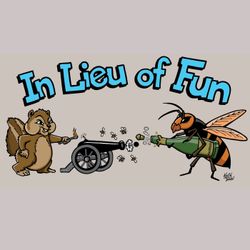Share

In Lieu of Fun: #DogShirtTV
Unpacking the Debate With Tyler McBrien
Season 4, Ep. 3
•
Wherein I am joined by the estimable Tyler McBrien--aka Spicy Tyler--to talk about the Harris-Trump debate from the previous evening. We will also, of course, discuss spices.
More episodes
View all episodes

275. Inanity and Authenticity
01:05:59||Season 4, Ep. 275Wherein Ben, Holly Berkley Fletcher, and Mike Feinberg start out discussing karaoke and birthday parties and end up opining on the nature of authenticity in the digital age.
274. Just Give People Money with Caitlin Tulloch
01:03:12||Season 4, Ep. 274Wherein Ben and Holly Berkley Fletcher welcome Caitlin Tulloch of GiveDirectly, an NGO dedicated to giving cash directly to people living in poverty, to discuss the effects of cash aid.
273. This Week in Denmark
01:00:44||Season 4, Ep. 273Wherein Ben and Minna Ålander discuss Denmark's recent diplomatic actions, including categorizing the US as a threat and forcing the EU to freeze Russian assets.
272. Understanding Ottawa
01:02:02||Season 4, Ep. 272Wherein Ben and Eve Gaumond talk dissertation writing, slum-lording, and Ottawa.
271. John Quincy Adams with Lindsay Chervinsky
01:01:17||Season 4, Ep. 271Wherein Ben and Holly Berkley Fletcher welcome historian Lindsay Chervinsky to discuss her current research on John Quincy Adams.
270. Dystopian Unsubtlety
01:00:40||Season 4, Ep. 270Wherein Ben, Holly Berkley Fletcher, and Mike Feinberg discuss why dystopian fiction does not match our dystopian reality. Jonathan Rauch joins in to talk about sex scandals.
269. The Drunk Raccoon Episode
58:39||Season 4, Ep. 269Wherein Ben and Holly Berkley Fletcher mock an alcoholic raccoon. They also discuss conservation in Kenya and corruption in the US.
268. Corruption and Interruption
58:15||Season 4, Ep. 268Wherein Ben and Anastasiia Lapatina discuss Andriy Yermak, Zelenskyy's long-time chief of staff who was recently fired for corruption. Ava interrupts.
267. Italian Populism with Francesco Galietti
57:01||Season 4, Ep. 267Wherein Ben and Alicia Wanless welcome Francesco Galietti, an Italian political analyst, to discuss how the election of a right-wing populist has and has not changed Italy.